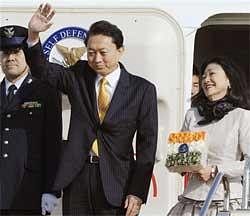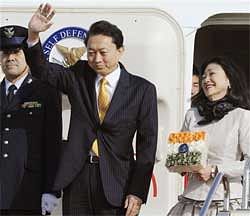

The new Japanese Prime Minister, who took over in mid-September, will reach Mumbai where he will pay tributes to the victims of 26/11 terror attacks and sign a condolence book in Trident hotel.
He will also interact with top Indian business leaders, including Ratan Tata, before heading to New Delhi on Monday where he will hold delegation level talks with Singh.
"The two Prime Ministers will discuss ways to expand, enhance and strengthen the India-Japan Strategic and Global Partnership. They will also discuss regional and global issues," Foreign Ministry Spokesman Vishnu Prakash said while briefing the reporters about the upcoming visit.
Singh will also host a private dinner on Monday for the 62-year-old Japanese leader who is accompanied by his wife Miyuki Hatoyama and senior ministers of his government.
The two leaders will sit down for delegation-level talks on Tuesday followed by a brief joint press interaction, he said. This will be the 4th Annual Summit between the Prime Ministers of India and Japan since 2006.
Asked if the two leaders will talk about cooperation in the field of civil nuclear energy, Prakash said the "entire gamut" is going to be discussed.
On any agreements to be signed during the visit, the Foreign Office spokesman said it was not possible to prejudge anything.
The visit will focus on giving a political push to free trade area negotiations and expanding the ambit of security cooperation between the two countries.
Japan is the sixth largest investor in India with USD three billion in investments and plays a crucial role in some of the key infrastructure projects such as dedicated freight corridors in the country.
The two countries signed a security cooperation agreement during Manmohan Singh's visit last year, the second country after the US with which Japan has inked such a pact providing for training and capacity building.
The two countries are close to firming up an action plan to add more content to this agreement, which will also include joint army exercises.
Hatoyama's maiden trip to India comes against the backdrop of Tokyo's bid to recast its relations in Asia and a desire to forge a stronger security and economic partnership with India, widely seen as an emerging Asian power along with China.
External affairs ministry's official spokesperson Vishnu Prakash said both leaders “would review progress and give political direction to accelerate progress in whichever areas are required”.
Incidentally, Hatoyama and Indian Prime Minister Manmohan Singh have already met twice on the sidelines of the Pittsburgh G-20 meet and the East Asia summit in Hua Hin.
India and Japan have already held 12 rounds of negotiations to agree on a Comprehensive Economic Partnership Agreement, with the last one held this September-October, but there area still issues to be ironed out, especially related to the services sector.
Officials said that while both countries have been moving closer in both trade and defence ties in recent years, the visit would be a good barometer for India to learn about the bigger strategic vision of the new Democratic Party government in Japan.
“There has been steady growth in trade,” Prakash said, noting that as per Japanese statistics, bilateral trade volume stood at $12 billion in 2008-2009.
“We already have a trade target of $20 billion by 2010. Japan is also the sixth largest investor in India...in the last 8-10 years, the actual investment has exceeded $2.5 billion,” he said.
India is also the largest recipient of Overseas Development Assistance from Japan that stood at $2.5 billion in 2008-09.
Japan is also helping in a Greenfield project to start an Indian Institute of Technology in Hyderabad.
It has also assisted in major development projects, like the Dedicated Freight Corridor linking Mumbai to Delhi and the eastern corridor linking West Bengal to Punjab, as well as an industrial corridor along the Delhi-Mumbai freight corridor.
Besides, India and Japan have been intensifying defence cooperation, participating in trilateral military exercises. Officials indicated that there is likely to be discussions on further increasing exchanges in this area.
On civil nuclear cooperation, there still seems to a distance between the two countries.
"We are appreciative of Japan's support at International Atomic Energy Agency, Vienna, and the Nuclear Suppliers Group which made it possible to engage in civil nuclear commerce with all countries," said Prakash.
He added that both nations agreed that nuclear power was a "safe, sustainable and renewable source of energy".
"We have exchanged view on our respective nuclear energy policies," he said, adding that energy security would also be a topic of discussion between the two leaders Tuesday.